Crowns are a remarkably versatile way to preserve damaged teeth
Around 12% of our fellow Texans have lost six or more of their teeth. At Favero Family Dental, we strive to keep all of our patients’ smiles intact! We emphasize protecting the teeth and gums and preventing the leading threats to these structures: dental decay and periodontal (gum) disease. Dental crowns present an important (and versatile!) way to preserve the teeth and avoid the need for dental extractions or the removal of decayed, broken, or infected teeth.
Putting a crown on it in Denton, Texas
Natural crowns are the white parts of the teeth that you can see above the gum line when you smile. The crown is made from protective enamel. While enamel is stronger than skeletal bone, it is not impervious to damage. The crown may be damaged due to wear and tear, cracks, progressive enamel erosion and decay, and the effects of gum disease. Our dentists, Drs. Stephen Blake Favero and Khourschid Favero can restore that damaged crown by rebuilding it anew.
There are many different dental materials that may be used to make your new crown. These materials include ceramics, such as porcelain, and metals like gold. Some crowns may be made from both; for instance, a porcelain overlay may be fused to a metal core for the ultimate blend of aesthetics and resiliency. Drs Khourschid Favero or Stephen Blake Favero are happy to discuss the advantages and disadvantages of each option with you while accounting for your unique needs and circumstances.
The crown itself is made using information about your tooth, including impressions or models of your tooth. Once the crown is created, we secure it over the cleaned and reshaped natural tooth. For this reason, dental crowns are sometimes referred to as “caps.” Think of this as a blank slate for your tooth! Your formerly damaged tooth gets a fresh start. Just be sure to clean your teeth and gums well, and continue to see us!
Call (940) 566-2847 with questions or to schedule your appointment at the office of Favero Family Dental in Denton, TX. If you already have gaps in your smile, crowns are also so versatile that they may be used for tooth replacement, for instance, as part of a dental bridge or to replace teeth with dental implants positioned in the jawbone.
Before & After Results



Dr. Stephen Blake Favero

Dr. Khourschid Favero
Drs. Khourschid Favero and Stephen Blake Favero are esteemed dental professionals who exemplify expertise, authoritativeness, and trustworthiness. Dr. Stephen Blake Favero, originally from St. Louis, Missouri, earned his undergraduate degree from Brigham Young University and pursued dentistry at the Arizona School of Dentistry & Oral Health. There, he met his future wife, Dr. Khourschid Favero, a UCLA graduate from Simi Valley, CA. The couple, who fell in love during dental school, now proudly serves the Denton, TX, community through Favero Family Dental. They are committed to excellence and utilize cutting-edge dental equipment, offering services from checkups and cleanings to cosmetic procedures and emergency dentistry. Patients praise their personalized, comfortable approach, making Favero Family Dental a trusted choice in Denton County, TX.



